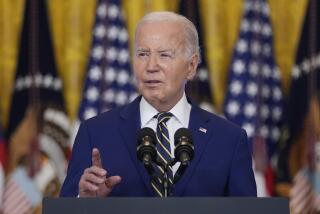Presidential Pardons Shake Up Political Establishment : Iran-Contra: Democrats denounce action by Bush, but Republicans defend move as courageous, compassionate.
WASHINGTON — The announcement of presidential pardons for Caspar W. Weinberger and other Iran-Contra defendants shook the nation’s political Establishment Thursday, with leading Democrats charging that the action will worsen the erosion of public respect for the law while Republicans rallied to President Bush’s defense.
“It leads people to believe that if you’re high enough up and you commit a crime, you can get off,” said Sen. Dale Bumpers (D-Ark.)
President-elect Bill Clinton voiced similar criticism. “I am concerned about any action which sends a signal that if you work for the government you’re above the law or that not telling the truth to Congress under oath is somehow less serious than not telling the truth to some other body under oath,” Clinton told reporters in Little Rock, Ark.
Senior Republicans said it showed courage for Bush to take a compassionate step that puts the historical judgment of his presidency at risk. Only the independent counsel and “those who care more about partisanship than justice should be disappointed by this Christmas Eve act of courage and compassion,” said Sen. Bob Dole (R-Kan.), one of several in the GOP who had campaigned for the pardon.
He dismissed prosecutor Lawrence E. Walsh’s probe as a “witch hunt” that was “twisting justice.”
Former President Ronald Reagan, who appointed Weinberger to his Cabinet, sent word that he was pleased by the pardons.
Experts in constitutional law agreed that a President’s power to pardon anyone, before or after conviction, was absolute and could not be challenged. But some said that Bush could be criticized for his decision since the evidence presented in Weinberger’s trial, had it proceeded next month as scheduled, might have shed light on Bush’s own conduct in the Iran-Contra affair and his subsequent explanations of it.
Senate Majority Leader George J. Mitchell (D-Me.), a former federal judge, condemned the pardons as wrong and said they showed “contempt for democratic processes and the rule of law” by Bush in the final days of his term.
Noting that Weinberger was accused of concealing evidence and lying to Congress about the arms-for-hostages deal, Mitchell said in his statement: “Our system of government cannot function effectively if the legislative branch has no assurance of the truthfulness of the officials of the executive branch which come before it.”
Bumpers said he admires Weinberger and former Secretary of State George P. Shultz for opposing Reagan’s decision to sell arms to Iran in hopes of gaining the release of U.S. hostages in the Middle East.
“But that is not the issue,” Bumpers added. “The issue is doing things that circumvent the law and then lying to Congress about what transpired. . . . It seems to me that lying to Congress has become almost epidemic.”
House Majority Leader Richard A. Gephardt (D-Mo.) termed the pardons disturbing regardless of the legal merits of individual cases.
“The pardon maintains the appearance of an Iran-Contra cover-up, suggests presidential approval of violations of law, and condones ill-founded foreign policy decisions that never would have been made in the light of day,” Gephardt said in a statement.
Not all Democrats criticized Bush’s action. Rep. Dave McCurdy (D-Okla.), chairman of the House Intelligence Committee, said that “it’s now been almost seven years” since the probe began and “I’m not sure justice is served” by continuing.
Laurence H. Tribe, a constitutional scholar at Harvard University, called Bush’s pardons “most unusual” since questions remained about his own knowledge or role in the decision to ship arms to Iran and use part of the proceeds to support armed resistance to the Sandinista regime in Nicaragua.
When President Gerald R. Ford pardoned former President Richard M. Nixon in 1974, Tribe said, no one suggested that Ford had anything to do with the Watergate cover-up that forced Nixon from office.
But Weinberger’s notes suggest that Bush knew of the arms-for-hostages plans, he added.
“There is no question about the legal authority of the President to wield his pardon pen but there also is very little question that as a matter of morality the verdict of history will not be a kind one for the President,” Tribe said in an interview.
Dole said the Iran-Contra case was ideal for use of the presidential pardon because “there’s no way justice could have been served” by having Weinberger go to trial. “It’s clear that Lawrence Walsh and his desperate henchmen would have stopped at nothing to validate their reckless $35-million inquisition,” he said.
David Dellinger, a professor of constitutional law at Duke University, said there is ample precedent for pardoning individuals before trial or conviction.
“One troublesome aspect of a pretrial witch-hunt pardon (for Weinberger) is that the public will never know the full facts that would be revealed at trial,” he said.
More to Read
Get the L.A. Times Politics newsletter
Deeply reported insights into legislation, politics and policy from Sacramento, Washington and beyond. In your inbox three times per week.
You may occasionally receive promotional content from the Los Angeles Times.










